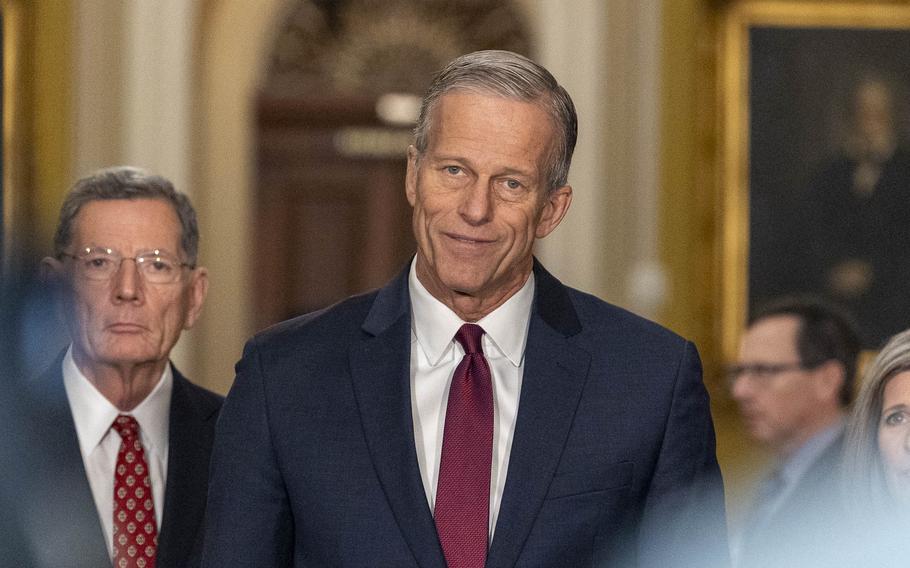
Senator John Thune, (R-S. Dak.), during a news conference following the senate luncheons in the U.S. Capitol on Tuesday, December 17, 2024 in Washington. (Eric Kayne/Stars and Stripes)
WASHINGTON — New Senate Majority Leader John Thune is kicking off the new session with a promise to preserve the filibuster, saying in his first floor speech as leader that his priority will be to “ensure the Senate stays the Senate.”
Thune, R-S.D., and Senate Republicans are taking power on Friday a little more than two weeks before Donald Trump will be inaugurated, cementing a firm GOP hold on Washington. And Thune will have to navigate his new responsibilities along with the new president, who has made clear he expects allegiance from Congress – and has previously called for eliminating the filibuster.
Opening up the two-year Senate session Friday after new and returning senators were sworn in, Thune said the legislative tactic that allows senators to delay consideration of a measure and require 60 votes for passage has “perhaps the greatest impact in preserving the Founders’ vision of the Senate.”
“There are a lot of people out there who would like to see the Senate turn into a copy of the House of Representatives,” Thune said. “And that is not what our founders intended or what our country needs.”
Senate Republicans have long maintained that the filibuster remain in place despite Trump’s pleas to eliminate it and speed his agenda during the first half of his first term, when Republicans also had control of the White House and Congress. Many Democrats wanted to eliminate the filibuster in the early days of President Joe Biden’s term, but were stymied by moderates in the Senate Democratic caucus who said it would upend the Senate’s deliberative role. Former West Virginia Sen. Joe Manchin, D-W.V., has called it “the holy grail of democracy.”
While Republicans aren’t ready to eliminate the filibuster, which will make it harder to win some votes in the new 53-47 Senate, they are preparing to try and quickly pass much Trump’s agenda through a legislative mechanism that circumvents it. Like Democrats during Biden’s term, they are planning to use a process called budget reconciliation that would allow them to approve bills on party-line votes, with a simple majority. Early priorities will be border security and reviving tax cuts from Trump’s first term.
The Senate will also have to approve Trump’s Cabinet nominees, some of whom have already faced skepticism from Republican senators, once he is inaugurated on Jan. 20. Hearings are expected to begin before then.
Thune was elected by the GOP conference in November to replace Mitch McConnell, the longtime Republican leader who announced last year that he would stay in the Senate but step down from leadership. Outgoing Majority Leader Chuck Schumer, who will remain Democratic leader, advised Thune in a floor speech on Friday to work in a bipartisan way on legislation, pointing to bills like an infrastructure package passed by the Democratic majority during the first half of Biden’s presidency.
“The majority leader sets the tone and that tone determines to a large extent how successful we’ll be moving forward,” Schumer said.
It’s unclear though, how much leverage or desire Thune will have to seek out bipartisanship as Trump has pressured him already to circumvent Senate rules and pass some of his Cabinet nominees without votes.
Ahead of the inevitable partisan fights, though, there was a celebratory mood Friday as nine new senators were sworn in – four Democrats and five Republicans. Vice President Kamala Harris presided as they approached the dais in groups of four, along with returning senators, taking the oath of office and signing a ceremonial book. Vice President-elect JD Vance, still an Ohio senator, was also on the floor and stood up with new Ohio Sen. Bernie Moreno, a Republican who defeated Democrat Sherrod Brown, as he was sworn in.
Two newly-elected Democrats were already sworn in last month to fill vacancies and were sworn in again on Friday. California Sen. Adam Schiff was elected to fill the seat of the late Democratic Sen. Dianne Feinstein and New Jersey Sen. Andy Kim replaced former Sen. Bob Menendez, who resigned last year after his federal conviction on bribery charges.
A sixth Republican, Jim Justice of West Virginia, announced last month that he will wait to enter the Senate until after his successor as West Virginia’s governor, Republican Patrick Morrisey, is sworn in on Jan. 13.
Associated Press writer John Raby contributed from Charleston, West Virginia.